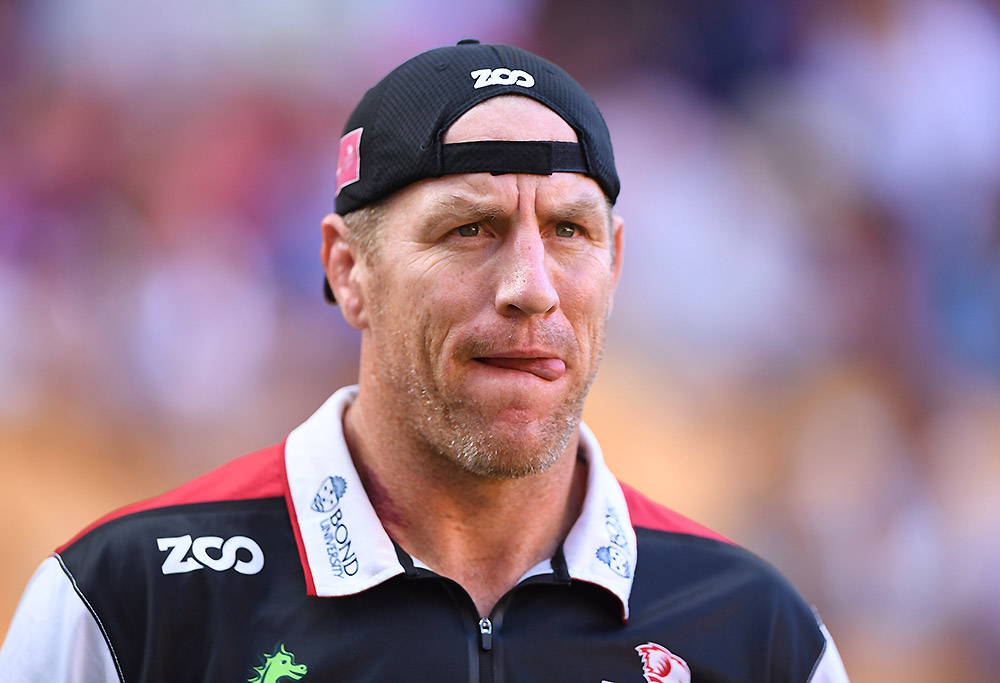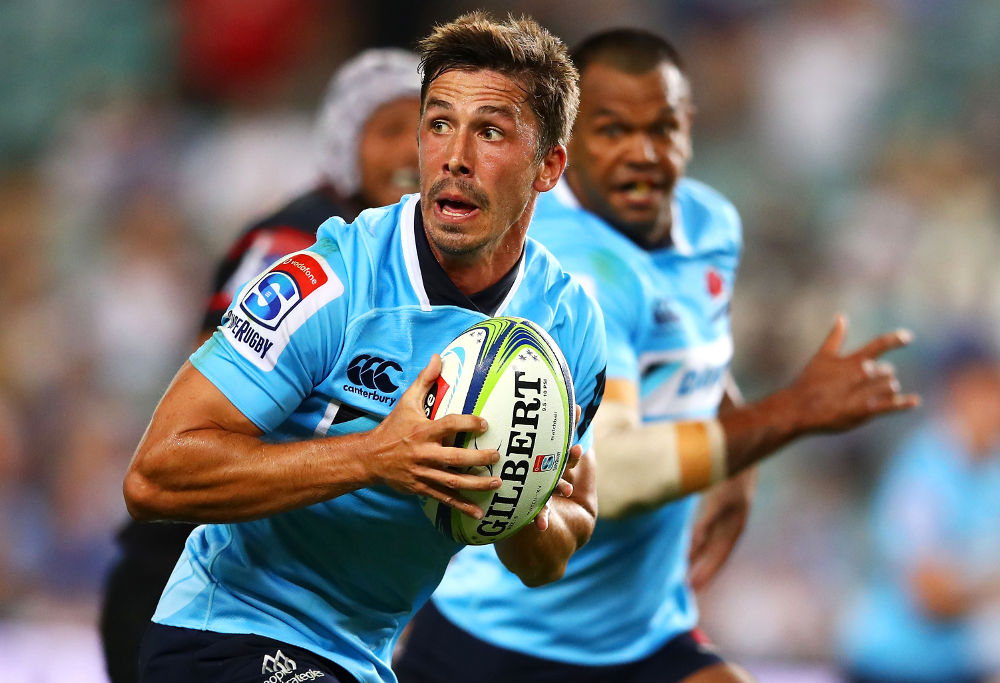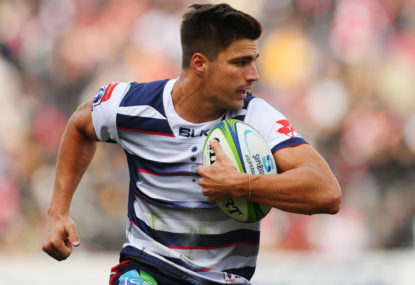‘There is no “I” in team’ is about the oldest adage in sports.
A young and inexperienced Reds side demonstrated this old truth on Friday night against a disappointing Brumbies side. Everyone playing for the Reds contributed to the victory by competing at the rucks and set pieces, running hard into contact areas and determinedly tackling at the gain line or scrambling back in defence to clear up dangerous situations.
If ever a side reflected the character and determination of its coach Brad Thorn, a legendary hard man committed totally to winning, the Reds did.
The victory wasn’t pretty with the Reds scoring six penalty goals to two unconverted tries.
But it was a victory that was badly needed by the Reds franchise. This truth was acknowledged when many of the 11,034 spectators at the ground stood up and applauded when Thorn’s face and voice came up on the big screen talking about how proud he was of the effort put in by his youngsters.
It is a matter of record and conjecture that Thorn has taken an enormous gamble of rejecting a couple of gifted playmakers (Quade Cooper and Nick Frisby) in favour of journeyman players like Jono Lance.
Where Lance and the other journeymen fit into the Thorn method is that they tackle relentlessly and hold their nerve in difficult situations. One of Lance’s interventions to prevent a Brumbies try from a break-out was breathtaking as he raced back and grabbed a bouncing ball to enable a dangerous situation to be defused.
Friday night’s stunning victory by the Reds was a win based entirely on defence. Towards the end of the game, the Brumbies mounted a 16-phase attack inside the Reds’ 22. The attack was eventually repelled. The crux of the matter during all this furious attack and equally furious defence is that this current young Reds squad needs everyone to be a tackler to hold out more experienced sides.
But in due course, especially when the Reds begin to play New Zealand teams, they will have to be more expansive in running the ball than they were against the Brumbies if they want to be even competitive, let alone achieving victories.
Thorn’s emphasis on set-piece play, a rampaging pack and the occasional incisive breakout by a back is in the tradition of Queensland rugby. It is also a good thing for the Wallabies. The national side is invariably strong when rangy, hard-as-nails Reds forwards are matched with brilliant running backs from New South Wales.
There is a long way, obviously, for the Reds pack to go before it starts to offer up the equivalent of Mark Loane, Tony Shaw or John Eales (the greatest of all the Reds’ forwards) to Michael Cheika.
But these are early days for a coach who seems to understand how to develop players and how to inculcate team spirit. I don’t expect Queensland to make the finals. But I do expect the Reds to grow as a side that will become formidable in a year or so.

( AAP Image/Dave Hunt)
The two other Australian Super Rugby sides that did well in the weekend, the Melbourne Rebels (37-17 victors over the Sunwolves in Tokyo ) and the NSW Waratahs (24-24 against the Sharks in Durban) also demonstrated an improved team spirit over their dispiriting performances last season.
The Rebels’ victory meant that they have won their opening two games of the season for the first time in the history of the franchise.
The first half performance of the Rebels, though, was disappointing. There was too much kicking away of the ball by the backs. In fact, George Gregan made the point in his half-time summary that the way the Rebels were kicking away possession “kept the Sunwolves in the game.”
I can never understand why teams win, say, a lineout and the halfback or number ten then kicks the ball to the opposition, as the Rebels did, and wonder why they aren’t scoring points.
These tactics ended up allowing the Sunwolves to go into the half-time break at 10-10, even though they were in their own territory most of the spell.
In the second half, the Rebels started to play with the ball and looked to be on many occasions a quality side.
It is early in the season admittedly but it seems to me that the Rebels look to be the best chance for an Australian side to go deep into the tournament.
The Waratahs started the tournament with a win in Sydney against the Stormers – snatched at the death – and a draw against the Sharks at Durban which was also snatched with time virtually up.
Sides that have the resilience to snatch victories and draws under the pressure of time are sides that have a strong team culture. They have a toughness of spirit that can cover up for technical weaknesses in the playing squad.
I would suggest that the presence of Simon Cron, the coach of Norths in their Shute Shield triumph, has something to do with this obvious and new team spirit.
The Waratahs, unfortunately, also have a smallish pack. And unless this is redressed, they are going to struggle against the top South African and New Zealand sides.
In both games so far this season, the New South Wales pack has been monstered in the scrums. Something will have to change in this area. I would expect a new front row, for instance, for the game against the Jaguares, a team that is being mentored by the former Wallabies scrum coach Mario Ledesma.
There were aspects of the Waratahs’ play, especially in the backs, that suggest some intelligent thinking and practice has gone on within the coaching staff and players.

(Photo by Mark Kolbe/Getty Images)
The halves, for instance, kicked out (a good thing) when clearing from inside the Waratahs 22. Box kicks, that dreaded and useless tactic unless done with 100 per cent accuracy, seemed to be banished.
Jake Gordon, too, played more like a traditional Waratahs running half, Nick Farr-Jones say, with his snipes and darts to challenge the defence around the rucks and scrums. The Waratahs backs looked immediately more dangerous with this running, especially when Mitch Short made a brilliant dash to the try line.
Short’s try, which capped off a promising cameo first match for the Waratahs, gave Bernard Foley the chance to kick the conversion to draw the match.
I liked the way Israel Folau played in the line on most attacks. His one effort to kick out in the tradition of the custodian was a terrible one. What this effort suggested is that the running game is his forte, and the leaping game something that wasn’t tried against the Sharks, unfortunately.
Michael Hooper is getting back his running game, with his try in the 56th minute highlighting his great pace and the need for the Waratahs game plan to embrace this rather than trying to change him into a David Pocock clone obsessed with attacking the rucks.
The Australian sides are yet to play the stronger South African sides (the Lions and the Bulls) and any New Zealand sides. So we need to be cautious in our expectations. But there are promising signs that last season’s Super Rugby annus horribilis may be avoided this year.































































































